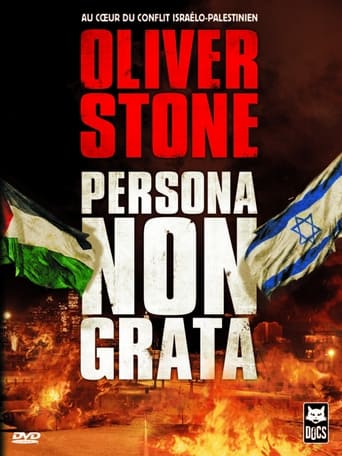Karl Self
This is a cinema verité, low key video documentary on Oliver Stone not getting an audition with Jassir Arafat, and interviewing a bunch of other guys (mostly top Israeli politicians including Ehud Barak, Shimon Peres and Benjamin Netanjahu, but also three al-Aqsa "martyrs") instead. It makes for interesting viewing, and conveys a good idea of the everyday squalor the Palestinians are living in, the haughtiness of the Fatah government, and the sheer complexity of the situation.This was recorded only a few years ago, but it already feels almost nostalgic, with Arafat's familiar ugly face and concrete rhetoric, suicide bombings and war in the streets of Ramallah. The olden days and their simpler ways, I guess. The current war against in Gaza seems a lot nastier by comparison. Nothing ever seems to change for the better in that region.I think Oliver Stone's approach is a little too naive, and I hated all those art students constantly shoving their cameras into the faces of their interviewees. I also would have liked to see more of the common people and the political "middle management" rather than the celebrity talking heads. But it's still interesting viewing because it catches a rarely seen glimpse of the day-to-day life in Palestine.
Chrieon
Persona Non Grata [Pur'sownu'nân'gratu] An unwelcome person. [n] a person who for some reason is not wanted or welcome. [n] a diplomat who is unacceptable to the government to which he is sent.Oliver Stone (Platoon, Born on the Fourth of July, JFK and recently Commandante) and his team take you to Israel and Palestine. The conflict seems to have no end except in a near distant future where the winner stand alone and the losers falls together. As visually moving as with any other Stone movie and With impressing cutting-techniques of a flow of images paralleling the interviewees' dialogs which provides a very interesting summary of the Israel/Palestinian conflict through the leading persons' stories on both sides. All this backed up with an esoteric soundtrack. He puts lots of weight on the Israel leaders' stories and the hunt for an interview with Yasser Arafat is portrayed. He also tries to balance interviews with civilians on the street from both sides along with a very intimate meeting with masked "freedom fighters", mostly young people with a normal life. It's clear that the conflict is about two people who are "sick & tired" and desperately show their powerlessness.I found this documentary, or reportage, very interesting yet uncomfortable for the elite. I was surprised that so many were willing to express themselves even the most uncomfortable questions pressed by Stone. It felt like I was watching a news coverage on CNN with a heavy influence from the MTV cutting. Even though the camera is constantly unstable and seems heavy, some might find it annoying, but the person or situation in question makes it easy to ignore the fast cutting of images and sound. It's indeed very creative and 'Stoneish'. I say again very interesting and informative, but not so fair and balanced than I hoped, could have interviewed some more Israel civilians or their army and the settlers.I saw it on the Stockholm Film Festival yet without subtitles, some people complained but I didn't find it that problematic, but it was one of few flaws. Except that I say to you if you are interested to see this:Turn off "Survivor" and "Idol" and get educated. This is such a film.I give it an 8 out of 10
sarastro7
One of the other comments here called Oliver Stone a "self proclaimed messiah". He is nothing of the sort. He is one of the rare Americans who's taking it upon himself to try and educate an ungrateful domestic audience about what's going on in the world, and giving the American people a more nuanced picture of the facts than they are accustomed to from their usual media.The thanks he gets is to have his documentaries banned, because the ruling elite of America doesn't want an enlightened public. The fact that the U.S. authorities consider Stone's well-balanced, truth-revealing work to be dangerous, ought to make a lot of people stand up and take notice.10 out of 10.
Raúl Quintanilla Alvarado
It seems to me that quite a few USA citizens might be looking this documentary the wrong way. In this documentary we get the latest of the Palestinian conflict, we get both side of the story.Oliver Stone is constantly pressing on the politics and terrorists, he wants to get answers and hopefully get the conflict solved. But there is also a feeling of invasion from the camera operators, going around in the background, the unstable camera movements and violent edition. This is a style associated both to Oliver Stone and the MTV generation, but it's not gratuitous, this invasion is the only real invasion.Oliver Stone surrounds himself with young people, and he is in a way making a movie of them, their reactions to the conflict. He wants them to look at what their country is doing. He also wants the viewer to be conscious of his presence in this movie, we are this invading eye, we are this Persona Non Grata.

